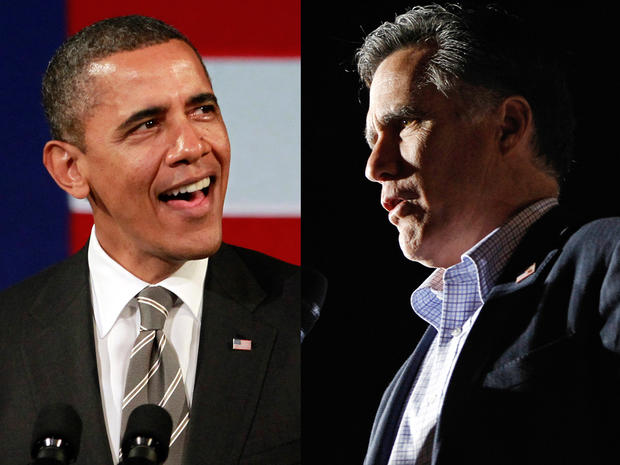Obama, Romney getting cozier with super PACs
This article originally appeared on RealClearPolitics.
Within the next few weeks, top administration officials ranging from cabinet secretaries like Kathleen Sebelius to senior advisers like David Axelrod will begin hobnobbing at high-dollar fundraisers for Priorities USA Action -- the super PAC created by former White House aides to bolster President Obama's re-election chances.
The Federal Election Commission rules that bar such power players from directly asking for donations are no impediment to the implicit solicitation of the big-figure checks that will inevitably pour in.
And so the presence at these events of prominent government figures with direct lines to the president -- and the concerns their presence raises about money buying access in American politics -- will mark another step in the central role that super PACs are playing in the 2012 race for the White House.
Obama campaign officials told RCP that the president reversed course on his 2008 disavowal of help from outside groups after senior strategists convinced him that his re-election hopes could hinge on playing in the real-world campaign finance system rather than his idealized one.
It's the same reasoning that Republican front-runner Mitt Romney has used to justify his own actions, inching closer to the FEC's line that limits -- but does not disallow -- coordination between campaigns and outside groups.
Last July, Romney was the first candidate to test the implications of the Supreme Court's 2010 Citizens United ruling when he spoke at a New York fundraiser for Restore Our Future, the group created to bolster his candidacy by soliciting unlimited contributions from individuals and corporations.
As the battle for the GOP presidential nomination has intensified, the super PACs acting on behalf of the four major Republican candidates have ramped up their negative campaigning against one another.
Several news sources reported Monday that Restore Our Future, which raised more than $30 million in 2011, was poised to go on the air in Michigan (which holds its primary Feb. 28) as well as several Super Tuesday states (March 6).
On Friday, the Romney campaign announced that it would match Obama's latest move by authorizing top aides to appear at super PAC fundraisers.
Additionally, a senior Romney aide told RCP that they have not ruled out having the candidate himself speak at additional Restore Our Future events down the line.
By contrast, the Obama campaign says that the president, the first lady, Vice President Biden and Jill Biden will not attend super PAC fundraisers.
But whether the candidates are on hand or not, campaign finance watchdogs are sounding the alarm that the presence of top aides at these events sends a dangerous message about buying influence.
"It seemingly amounts to a recognition by the campaigns that special interest donors are only going to open up their wallets if they're provided access with high-level decision-makers in exchange for their contributions, and that's a very troubling development," said Paul Ryan of the nonpartisan Campaign Legal Center. "The Obama move was really a significant step in the race to the bottom, in terms of providing access to special interest donors."
Despite the ethical questions that the Obama and Romney moves raise, the Federal Election Commission last summer deemed it perfectly legal for campaign officials and candidates to speak and be featured guests at super PAC fundraisers.
Although candidates and news reports have created a perception that the law bans all coordination between campaigns and super PACs, the only areas that are out of bounds are expenditures and direct candidate solicitation of contributions outside federal campaign limits.
Frustrated by this interpretation, independent overseers like Fred Wertheimer of Democracy 21 are increasingly focusing in on the FEC itself, accusing the organization of engaging in a wrongheaded reading of the law and purposefully inadequate enforcement of it.
"Our view is that the fundraising activities announced on behalf of the super PACs supporting President Obama and Mitt Romney are illegal," Wertheimer said. ". . . We expect to ask for a formal Justice Department investigation of both super PACs."
In a late December interview, Romney told RCP that he supported the abolishment of the current campaign finance system in favor of one that allowed for unlimited donations directly to campaigns, calling the existing system, which allows unlimited donations to outside groups, "the worst of both worlds."
Echoing the rationale cited by Obama's camp when it reversed its 2008 stance on outside groups, Romney campaign officials justified their recent move to act in conjunction with Restore Our Future by claiming that their opponent would outgun them if they did not act.
"This fall, the Republican nominee will be facing President Obama's billion dollar attack machine," former Minnesota Gov. Tim Pawlenty, a top Romney surrogate, said in a statement. "The Obama campaign has already made clear that they will stop at nothing to tear him down. If government officials are being used to raise money and defend President Obama's failed record, Republicans cannot stand idly by."
The claim that the Obama team will have $1 billion at its disposal has been a frequent refrain among Republicans, but it is one the president's aides vigorously deny.
"The only people who are saying we're going to raise a billion dollars are Republican operatives trying to discourage our small-dollar contributors," said Obama spokesman Ben LaBolt. "They haven't succeeded -- the average contribution to our campaign is $55, and more than 1.3 million Americans have contributed."
But despite continued solicitation of small donations, Obama's and Romney's recent decisions to coordinate more closely with their super PACs indicates a mutual acknowledgment that it will be the seven-figure checks from some of America's wealthiest individuals that will be essential to blanketing the airwaves on behalf of the president and the eventual Republican nominee heading into November.

